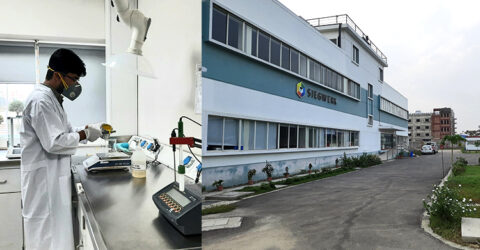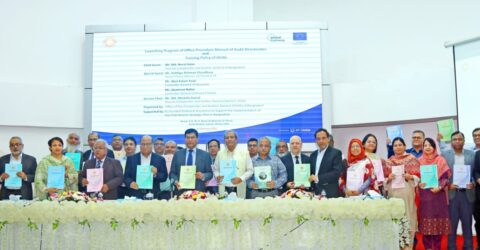
Iftekhar Rafiqullah and Mahbubul H. Siddiqee
As of July 7, 2020, there is no clear sign of improvement in the coronavirus pandemic situation around the globe. In fact, number of covid-19 positive cases has been increasing for last few weeks and this will likely continue in the coming days. The World Health Organization (WHO) fears that this might last for several months to even years. However, it’s not only coronavirus that the health experts around the globe are becoming increasingly nervous about.
While the infections with coronavirus itself remains the cause of primary concern, reports published in differed mainstream media sugest that unnecessary (often based on mere speculation) use of drugs in the treatment of covid-19 diseases, could be another big health issue. Therefore, it has become imperative to review health risks of using these drugs and determine the course of action for the future.
While the chance of ifection with coronavirus being fatal is not very high (in Bangladesh, fatality rate for the confirmed cases is around 1.2% overall), it could be more dangerous for those who have a weakened immune system due to aging or other illnesses (co-morbidity). More importantly, primary infection with coronavirus might weaken the immune system of an infected individual, which could make someone more susceptible to secondary infections by many opportunistic pathogens (such as bacteria, fungi, parasites, and other viruses).
As per published data, secondary viral, bacterial or fungal infections can occur in about 10 percent ofthe coronavirus infected patients and could be as high as 50 percent in case of the infected individuals who died afterwards. Therefore, perhaps it is very likely that these types of secondary infections could potentially increase the risk of coronavirus related death.
To prevent secondary infections caused by viruses, bacteria or fungi, a range of antimicrobial drug therapies are being used. These antimicrobial drugs work against infectious pathogens to either limit or kill them. Therefore, survival chances of the patients, depend on the working efficacy of these drugs. Apart from causing secondary infections in immunocompromized patients, a number of primary infections are also caused by infectious pathogens other than coronavirus. Overall, these infectious diseases account for at least 30 percent of all the commonly listed diseases across the world.
To treat all sort of infectious diseases, we need antimicrobial drugs. Indeed, for many of the deadly infectious diseases around us, like tuberculosis, pneumonia, meningitis, etc.; there is no alternative to antimicrobial drugs.
Unfortunately, for COVID-19, there is no single effective drug which can cure the diseases. Neither any vaccine is available at this moment. This no drug no vaccine situation pushes us to rely on our currently available drug pools used for other infectious diseases and non-specific for COVID-19. Because of the growing number of COVID-19 cases in compromised vulnerable groups, increased use of nonspecific drugs are being observed. However, as per the best practice, antimicrobials should be reserved for the patients with most severe presentations (e.g. those with high oxygen demands and rapidly progressing respiratory failure).
By now, it has become widely known that the main reason of antimicrobial resistance is unnecessary and arbitrary use of antimicrobial drugs. The incidence of such cases has increased sharply during this COVID-19 pandemic. In the current situation, indiscriminate use of antimicrobial drugs for mild fever, runny nose, cough or sore throat can further aggravate the antimicrobial resistant situation. Additionally, inappropriate use of steroids (eg., dexamethasone) without consulting the doctors or use of unproven drugs (eg., ivermectin- mostly used for parasites, not yet proven to treat covid-19 diseases) can deteriorate the situation. All these unnecessary and imprudent use of antimicrobial drugs may aggravate the overall infectious disease management and infection prevention and control in the near future. Indeed, WHO raised concerns regarding this matter more than once. So, this is perhaps high time to take it seriously and work on mitigating the reasons behind it. Otherwise, this could lead to major treatment problem around the globe.
It is important for general people as well as for administrators of medical services and those involved in clinical management to be aware of these now. We believe the following measures might be effective in this endeavor-
- Ramp up ongoing efforts to raise mass awareness to inform general people about potential dangers of self-medication, especially in the context of coronavirus pandemic. Due to high proportion of young people are present in our community, and a big chunk of them areactive social media users; telecasting awareness campaigns through Facebook and YouTube could be the quickest way to reach mass people.
- Intense media campaign aiming all the stakeholders involved in the chain of drug disbursement and management could be helpful. Steps can also be taken to increase awareness among the clinicians working in hospitals and the local medical assistant and family planning workers(LMAFPs) providing health service in the community. Media can play important role by not sharing news of unproven drugs.
- Ensure proper and moderate use of antimicrobial drugs in hospitals through initiatives of the Directorate General of Health Services and the Drug Administration. Treatment guideline for COVID-19 patients and other infectious as well as non-infectious diseases should be followed strictly. Without prior approval from drug authority and consent from patient, no one should administer unapproved drugs to their patient.
- In addition, retail pharmacies across the country need to be monitored to stop selling non-prescribed antimicrobial drugs. For this purpose, the current statutory acts can be enacted. Monitoring can be ramped up. In addition, special directive can be circulated from DGDA to stop selling partial doze of antibiotics.
- Immediate implementation of national antimicrobial resistance containment policy in BD can be considered.
Although the above recommendations can be challenging to implement in some cases, it is not impossible to do so. We believe, misuse and overuse of antimicrobial drugs can be prevented by taking actions mentioned above.
One of the authors, Iftekhar Rafiqullah, is a PhD Researcher at the University of Mississippi Medical Center, United States. He also served as the former national coordinator, Global Antibiotic Resistance Partnership in Bangladesh. He can be reached at [email protected]
The other, Mahbubul H. Siddiqee, is a coordinator of Microbiology Program, BRAC University, Dhaka. He has a PhD in Public Health Microbiology from MONASH University, Australia. He can be reached at [email protected]




